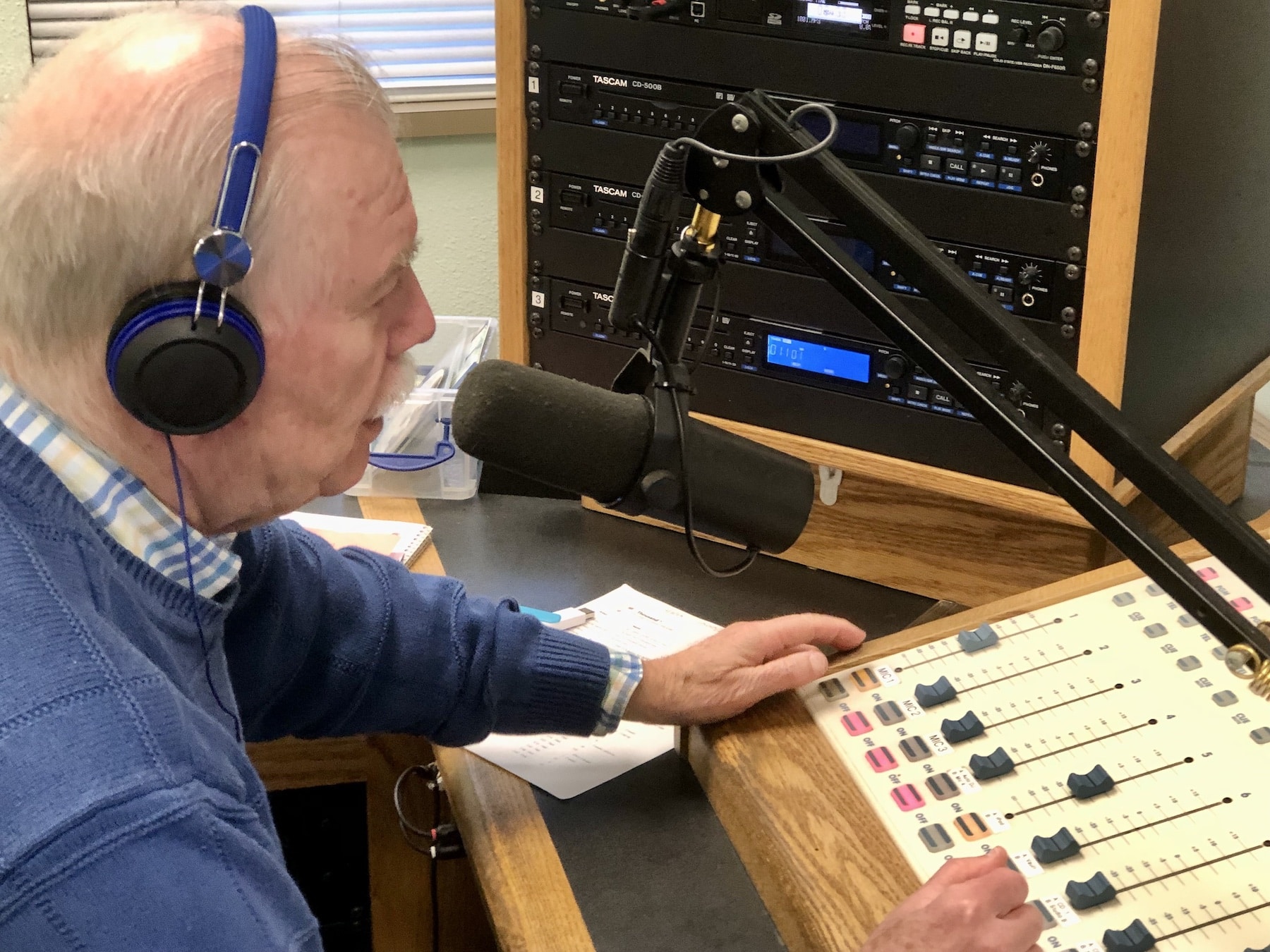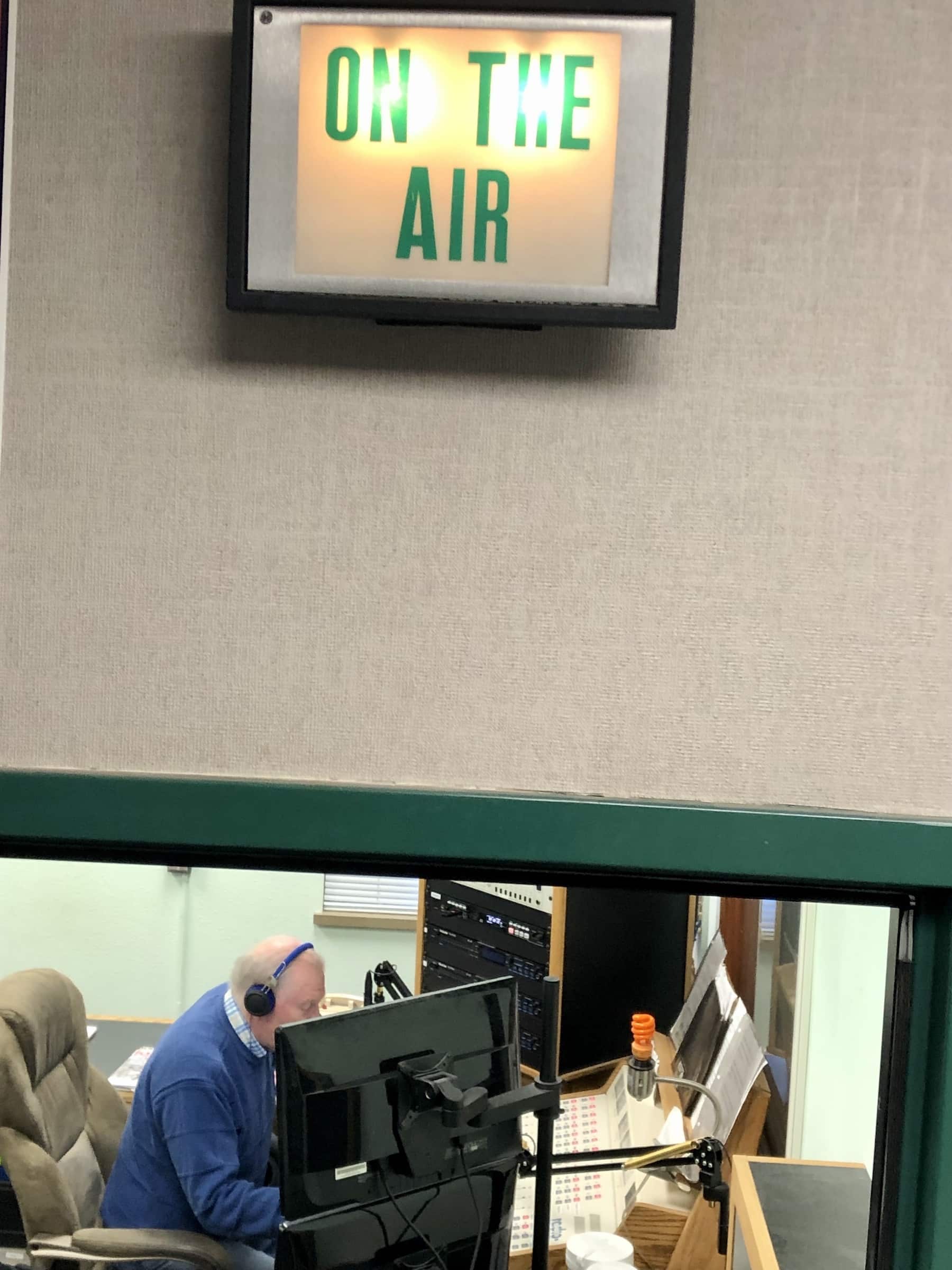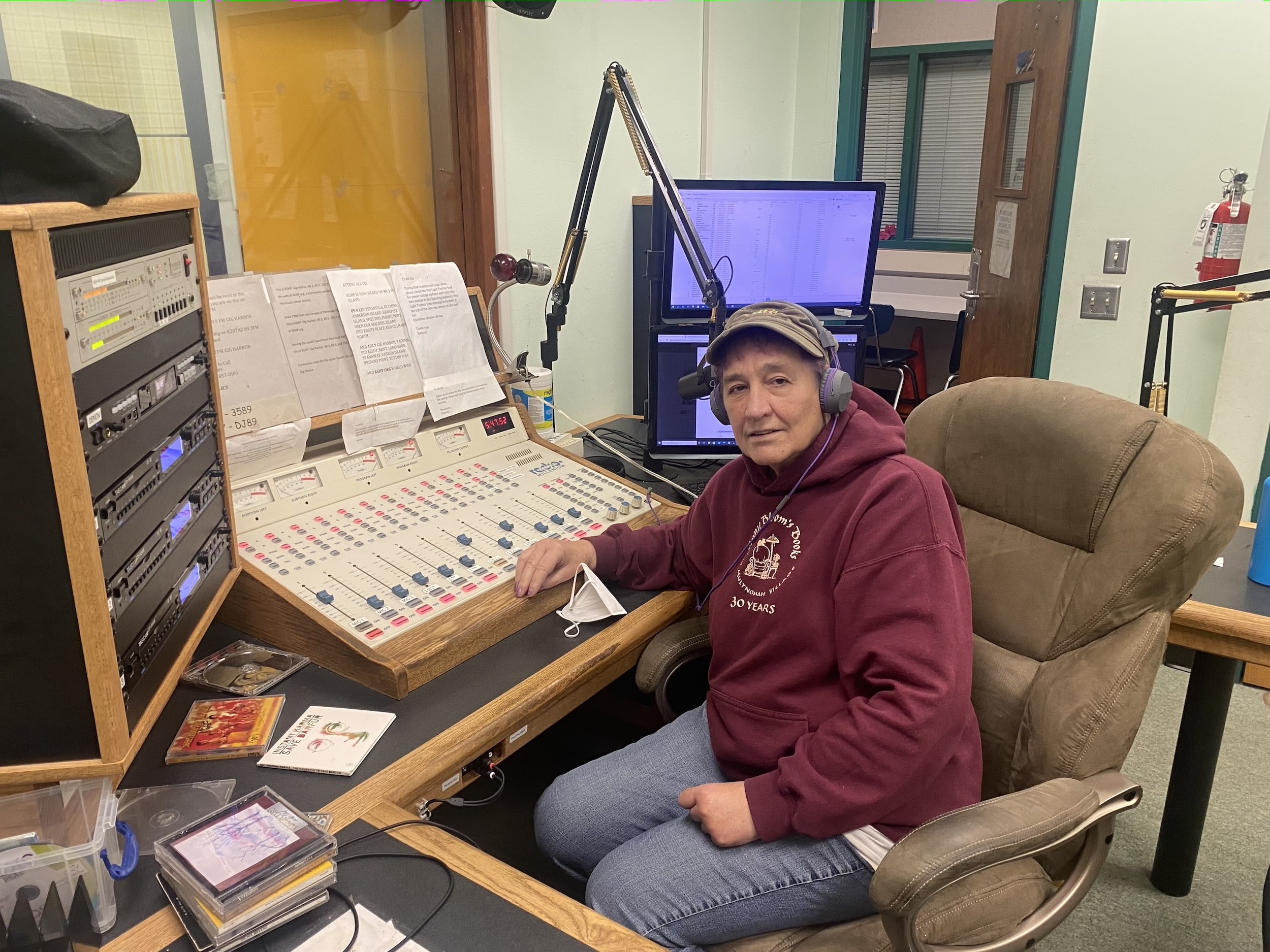Community Education
School district, community groups ponder fate of KGHP radio station
More than 30 people with an interest in the fate of KGHP-FM radio showed up Tuesday to a meeting hosted by Peninsula School District, which owns the station.
Education Sponsor
Education stories are made possible in part by Tacoma Community College, a proud sponsor of Gig Harbor Now.
Some were faithful listeners of KGHP, which has operated since 1988. Some were volunteer program hosts who have kept the station on air since its manager was laid off last spring. Others represented community groups and nonprofits who may play a role in its future.
Their overwhelming message to school officials was an S.O.S. not to jettison the station, which is no longer part of the district’s educational program.
Station costs district $25,000 per year
The district cut broadcasting classes in the 2021-22 school year following the retirement of longtime instructor Leland Smith. Last spring, the district laid off longtime station manager Spencer Abersold amid a $12 million budget reduction. Volunteers have continued broadcasting, but KGPH’s future is precarious.
The district, which pays around $25,000 a year in operating costs, is open to partnering with interested entities and individuals to keep KGHP on air, Kris Hagel, executive director of digital learning, told the crowd. But the clock is ticking.
“Running a radio station we don’t use for education is challenging for us,” Hagel said. “And so, we’re trying to figure out what we’re going to need at this time to continue to run the station. What do we want it to be? If this community wants KGHP as part of the community, how can we help facilitate those conversations?”
How the district got a radio station
Community members concerned about local emergency communications founded KGHP in the 1980s. They approached the school district about hosting a radio station that would broadcast to Gig Harbor and the Key Peninsula.
Although the impetus was emergency broadcasting, volunteer hosts and broadcasting students served up a buffet of entertainment and community event programming — including live local high school sports coverage.
The FCC classifies the station, physically based in a wing of Peninsula High School, as a Low Power FM Noncommercial Educational Broadcast Station. That means its license can’t be sold to a for-profit entity. KGHP operates on three channels (105.7 FM, 89.9 FM and 89.3 FM), covering a radius that encompasses the Key Peninsula and the wider Gig Harbor area including parts of South Kitsap, Vashon Island and as far south as Joint Base Lewis-McChord.

Denny Dale broadcasts his 1,000th show Monday, April 3, from the radio studio at Peninsula High.
Online at kghp.org, its signal reaches far and wide. Longtime hosts like Denny Dale (aka DJ the Deejay) attest to listeners from across the country and overseas.
Keeping the lights on
The station hit a few potholes after Abersold’s departure. A contract engineer paid by the district keeps the equipment operational, but the district left programming up to volunteers. Dale helped revamp automated messages required by the FCC and other automated content. He and others have faithfully continued their regular shows, and several banded together to resume broadcasts of high school sports.
Locating equipment for live broadcasts in the partially shuttered station was a huge challenge, said Timothy Merk, a program host and sports announcer. They didn’t get back up and running until after Fish Bowl, the big annual rivalry between Peninsula and Gig Harbor high schools’ varsity football teams.
“Everything was a mess, and we put it back together,” Merk said. “We tried to put it back together. We did the best we could. Sports is a big deal, and we made a lot of money (through sponsorships). When (Abersold) left, we just had to pick up the pieces.”
Emergency communications
At the meeting, Jim Braden said his group — the Fox Island Community Recreation Association Emergency Response Organization — has a vested interest in seeing the station remain viable. “I’m here because of KGHP being an important element in emergency response for the area,” Braden said.
Former broadcasting instructor Smith, at the meeting, recalled manning the station into the wee hours of the morning during severe winter storms of 1996 and 2006, “broadcasting any and all community information that came to us in any way shape and form and putting it out there,” Smith said. “And we had people’s backs there for a couple of pretty scary times. Could it have been worse? Absolutely, but we were there. And we did our job, and that’s one of the reasons I’d certainly like to see KGHP continue for that real vital community information that it can provide.”
Besides emergency broadcasts, the station used to cover local festivals and events. Many at the meeting said they see its potential to remain a community hub for information and local culture.

Denny Dale speaks to listeners during his 1,000th show.
Enrollment in broadcasting wanes
The district’s broadcasting program in its heyday in the 1990s attracted dozens of students each term, with several sections that were always full. But that has changed.
“When I got here in ’96, every kid in class could tell you every radio station in the market, who their on-air personalities were,” Smith said. “Then about 2020, kids didn’t know how to turn on a radio. Things shifted. But I tell kids, you know, man, you can’t make a lot of money in radio, but you can make a lot of money with radio skills.”
Hagel said waning student interest directly led to ending broadcasting classes. Hagel said that a trend began around 2014.
Smith pinned the decline on a change in state graduation requirements around 2014. CORE 24 required that 17 of 24 credits toward graduation be in mandatory core classes, limiting students’ opportunities to take electives. The pandemic dealt a knockout blow to program enrollment.
Expanding field or dead end?
John Yellowlees, chief academic officer for teaching and learning, gave the administrative perspective on ending the broadcast program.
“We’re required to offer courses where there’s high student interest that aligns with the graduation and career pathways, and we can maximize student enrollment in those classes for financial and other reasons,” he said. “And it wasn’t sustainable from that perspective.”
Abersold weighed in. “I’d like to really push back on the idea there’s no interest in broadcasting,” he said. “We all know that you’ve got TikTok, you’ve got Facebook. You’ve got all these kids broadcasting themselves every single day, hundreds of thousands of them. They’re making huge careers out of it, OK? You also have television, you have internet, you have radio. And that field is expanding. There are so many jobs in that field that needs people to fill them.”
Hagel said the district is looking at how to tap into educational opportunities related to trends like podcasting and media influencers. But as far as FM radio broadcasting, he reiterated, “I don’t think there’s any evidence to suggest that our students have any interest whatsoever. So, what we’re trying to do is figure out where can we go.”
Station’s operating costs
Up to this year, Abersold’s salary made up the biggest part of the radio station’s annual budget. But, Abersold said, a large part of his job was fundraising through community partnerships with entities like fire departments, Pierce County and others whose donations help offset operating costs.
The district currently pays a contract engineer about $1,000 per month, and they have a lawyer on retainer for issues related to the FCC license. There’s no money budgeted for equipment repair or replacement, such as the no-longer-functioning generator that would provide back-up power for the station.
“The community expects us to use the money that we are given by the voters responsibly for the education of our students,” Hagel said. “And so, one of the kind of push-and-pull on this conversation is we’re now financing something that is not related to educating our students. And so how do we justify that to the community, and how do we have that conversation with the community?”

Betty Devereux, host of BD’s Books and Friends, takes a break from broadcasting her show at KGHP-FM. She is nearing her 1,000th show. Christina T Henry / Gig Harbor Now
Where does KGHP go from here?
The district has researched the value of the FCC license, which is negligible. “We’re not here to make money,” Hagel said. “We’re not here to sell anything. That’s not what we want to do.”
Obtaining a similar license today would be virtually impossible.
Superintendent Krestin Bahr at the meeting said the district is inclined to keep the radio station local if it were to transfer the license. She called it a “local treasure.”
The primary requirement is that it go to a non-commercial entity. Bahr sees three potential “buckets” for the station: emergency communications, community engagement and local events.
John Campbell, host of “Jpsfunkshow” on KGHP, asked if the district is open to the creation of a nonprofit that would run the station. “I believe that is 100 percent on the table,” Hagel said.
“Why re-invent the wheel?” asked “BD’s Books and Friends” host Betty Devereux, when there are existing nonprofits that may be interested in adopting KGHP.
Smith said he, Devereux and Dale recently visited a nonprofit radio station in Sequim whose model could serve as a template for a rebooted KGHP.
About a dozen people signed up to meet again with district officials about next steps. The list included representatives of several nonprofits including the Fox Island emergency group, the Gig Harbor Chamber of Commerce and Gig Harbor Now, a nonprofit news outlet founded in 2021 that covers Gig Harbor and the Key Peninsula.
Up for debate
One topic sure to be debated at future meetings is whether it’s better to keep KGPH under the district’s umbrella with beefed-up community support — and so keep it available for students — or for the district to let it go to another organization.
“Before you know it, once it’s gone, it’s not coming back. I guarantee you that,” said Kirsten Knapp, community member. “And I think that I would like to see some real hard evidence of why we should be removing it from the school other than just kids aren’t interested anymore. I don’t think that’s a good enough answer.”
Victor Rhett, a retiree with a background in finance, nonprofits and local government, said the station could still serve young people but that a move to the community would be a healthy step forward.
“This is an opportunity whereby this radio station can mature and grow up and achieve what’s next, it’s next calling,” he said. “Because the other one, is well, I think the radio station is past that point. So, this is an opportunity to say, you know, put up or shut up. Is this a community radio station? Who are we going to serve?”

